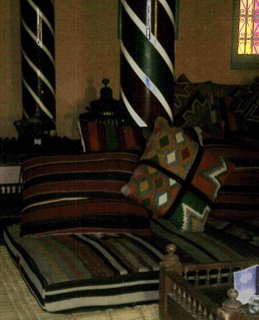Adventures in Time
 Rule No. #1: Don’t Buy Train Tickets in Advance
Rule No. #1: Don’t Buy Train Tickets in AdvancePreparing for my trip to Djerba, I bought a train ticket the day before, hoping to avoid a last minute rush. So, I learned a rule of travel in Tunisia: Don’t buy your train tickets in advance. Why? You might not make it to the station on time. I didn’t realize that, even in tourist areas, taxis are not available in early morning hours; and the hotel won’t have any backup provisions to find you one. So I missed the train to Gabès. An energetic taxi driver (one did show up; but we arrived one minute before the train left), who rush up to the train at the last moment, trying to arrange my last-minute boarding, but to no avail, took me back to the hotel. Then, he watched the louage station (a van leaves for its destination, when it fills). Finally, he found a first-class bus, which would go directly to Djerba. I was to wait ten minutes in a local barber shop, quite modern, with a whole stand devoted to about 20 bottles of different kinds of eau de toilette, new chairs with red plastic seats, fancy clocks on the counter in front of each client’s chair, towels clothes-pinned to a clothesline stand outside. I watched Al-Jazeera in English, which the barber said had been in operation for only 15 days. I continued to wait; and the bus arrived after about 45 minutes. The ride was comfortable, not overcrowded. As the air became stuffy and warmer, women remained fully clad in their long cloaks and headscarves or wrap-around cloth. The vehicle detoured to Kairouan but seemed to be making good progress. One stop was to but the local delicacy, makroud–little pastries filled usually with dates but also available with peanuts and almonds. At around 1:30 PM, we stopped at a roadside cafeteria for lunch.
Rule No. #2: Be Patient and Flexible
Underway again, the bus made an announced stop (most stops were unannounced) just outside Gabès, in front of tourist stands selling the local pottery, small stuffed camels, dates, and basketry. The driver started a series of calls on his cell phone. During the wait, Tunisian couples bought decorated drums and stuffed camels for their children. It turns out the deluxe bus had developed a problem; and we had to transfer to another one. This one was not so first-rate. Children jumped up and down on their parents’ laps; more seats were filled. However, we were on our way. It wasn’t long before we approached the ferry making the transit, across the strait, from the mainland to the isle of Djerba. The sun had set; and we made the crossing in the dark. It was fun–crescent moon above, stars showing in the clear sky, waves clapping up against the boat, as we crossed the wake of another vessel. Once across, the passengers quickly boarded; and we set out again. I finally got off at one of the stops, found a taxi (not too far from the bus stop) and arrived at my hotel.
I’m on my third pair of sunglasses.* First set of clips lost, second (bought in Marrakech) broken. Now, I have large-lense sunglasses, which wrap around my eyes and fit over the ones I have. My camera was stolen in the casbah in Algiers. I have adapted to another one of much more dubious quality. On the bus to Djerba, the bow to my glasses broke. I have an older, backup pair, so can continue to function. I just won’t as easily be able to “play the coquette.” Consequently, what is the lesson to be learned from all this? If you start the day with predetermined plans while traveling, decide how much energy you want to devote to clinging to your affixed schedule and how matters “should” be. Adapting to what happens and what is may be better for your health, psychological and otherwise.
 Rule #3: Enjoy or Learn from What’s There
Rule #3: Enjoy or Learn from What’s ThereIt’s two days past Thanksgiving. Other Americans are present here and there during this off-season in the tourist trade. Nonetheless, finding a replica of the traditional American Thanksgiving feast complete with roasted turkey was not probable. Any why try, when I can enjoy couscous, chorbas (soups with vermicelli, vegetables, and meat-often lamb or fish), mechoui (grilled meat), salads of carrots, radishes, peppers, tuna, onions, olives, and nokhai (small meatballs in tomato sauce with a few greens). The newest hotels have been constructed for the mass tourism market; and often don’t display much of the resident culture. Take where I’m staying. It’s on the beach; the service is high quality. For the most part, its main rooms are elegant in modern style but also sober and impersonal. In the Medusa Lounge Bar, offering evening global (translate bland) electronic keyboard music, Europeans in post-modernist, evening dress sit by each other Eric Hopper style. Tunisian costumes and metallic work adorn the entries of the spa and one restaurant. Only the Sidi Bou Said (Moorish) Café is intimate and captivating–a place where I could get a mint tea or Turkish coffee, relaxing on low cushioned banquettes. Water pipes are available for those interested. A large (4 ft.) white, wicker oriental birdcage with two parakeets stands near the entrance.
Opportunity to Learn
However, Djerba can be a case study in environmental tourism. How is the country’s necessary adoption of mass tourism, which brings jobs and income to the population, impacting on the people and culture of Tunisia? How is it affecting the island of Djerba? How much does the need for openness in attracting visitors conflict with the indigenous culture? Mass tourism usually leads to the creation of large hotel complexes (limited to a certain height here) and monotonous urban sprawl in the surrounding communities, which profit from the industry. At first impression, the large standardized (even Las Vegas style or Disneyland variety activities) appear concentrated on the northeastern coast of the island. Better hotels commit themselves to preserving the waterfront and deduct a small amount on checkout to donate to a charitable cause. Yet, is this enough? Or will the arrival of tourists en masse be such an assault on the environment and culture that it destroys the reasons travelers wanted to come here in the first place?
Forget your Cares
This is the way the world is, so why worry about it. For many, Tunisia’s shores, deserts, and underground cave dwellings (where Star Wars was filmed) are a chance to escape, to experience a sense of adventure (even if largely fictitious). Forget the cares of the world, peruse the markets selling cheap wares, get a massage, take a sauna, the world has muddled through this far; let it continue to do so. Lapse into denial for the moment, to reawaken later, after the trip, to think about taking one small step toward improving the human condition. If you think this is facetious, you can take a more conscious approach.
Accept the world as an imperfect place; but remain hopeful (an attitude which differs from optimistic, which considers progress inevitable) about the future.
*I'm now on a fourth set of sunglasses. The bow on my last pair dropped off on the way into the covered suqs (shops) at Houmt Souk, principal city on the island of Djerba. So, I have a new pair, which cost 9 Tunisian dinars ($7.00) and are allegedly made by Prada.


0 Comments:
Post a Comment
<< Home